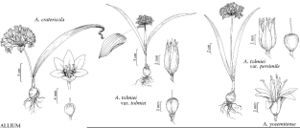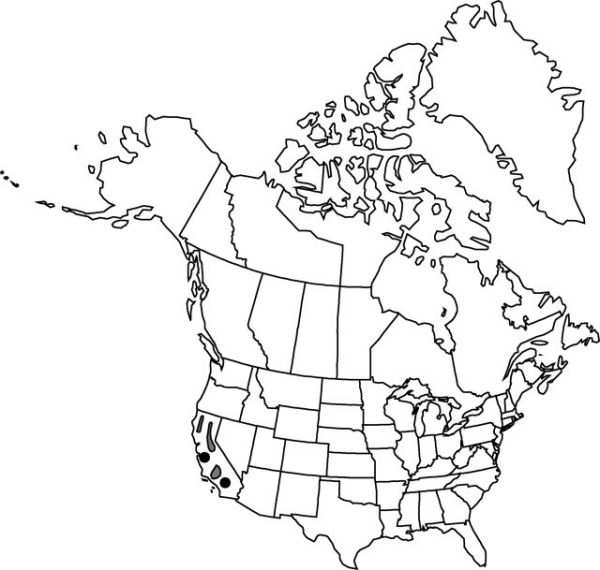Difference between revisions of "Allium cratericola"
Leafl. W. Bot. 1: 132. 1934.
FNA>Volume Importer |
imported>Volume Importer |
||
| (2 intermediate revisions by one other user not shown) | |||
| Line 6: | Line 6: | ||
|place=1: 132. 1934 | |place=1: 132. 1934 | ||
|year=1934 | |year=1934 | ||
| + | }} | ||
| + | |special_status={{Treatment/ID/Special_status | ||
| + | |code=F | ||
| + | |label=Illustrated | ||
| + | }}{{Treatment/ID/Special_status | ||
| + | |code=E | ||
| + | |label=Endemic | ||
}} | }} | ||
|basionyms= | |basionyms= | ||
| Line 11: | Line 18: | ||
|name=Allium parvum var. brucae | |name=Allium parvum var. brucae | ||
|authority=M. E. Jones | |authority=M. E. Jones | ||
| + | |rank=variety | ||
}} {{Treatment/ID/Synonym | }} {{Treatment/ID/Synonym | ||
|name=Allium parvum var. jacintense | |name=Allium parvum var. jacintense | ||
|authority=Munz | |authority=Munz | ||
| + | |rank=variety | ||
}} | }} | ||
|hierarchy=Liliaceae;Allium;Allium cratericola | |hierarchy=Liliaceae;Allium;Allium cratericola | ||
| Line 38: | Line 47: | ||
-->{{#Taxon: | -->{{#Taxon: | ||
name=Allium cratericola | name=Allium cratericola | ||
| − | |||
|authority=Eastwood | |authority=Eastwood | ||
|rank=species | |rank=species | ||
| Line 52: | Line 60: | ||
|publication title=Leafl. W. Bot. | |publication title=Leafl. W. Bot. | ||
|publication year=1934 | |publication year=1934 | ||
| − | |special status= | + | |special status=Illustrated;Endemic |
| − | |source xml=https:// | + | |source xml=https://bibilujan@bitbucket.org/aafc-mbb/fna-data-curation.git/src/bb6b7e3a7de7d3b7888a1ad48c7fd8f5c722d8d6/coarse_grained_fna_xml/V26/V26_513.xml |
|genus=Allium | |genus=Allium | ||
|species=Allium cratericola | |species=Allium cratericola | ||
Revision as of 23:18, 27 May 2020
Bulbs 1–3, not clustered on stout primary rhizome, ovoid, 1.5–2.5 × 1–2 cm; outer coats enclosing 1 or more bulbs, brown or gray, membranous, lacking cellular reticulation or cells arranged in only 2–3 rows distal to roots, ± quadrate, without fibers; inner coats white, cells obscure, ± quadrate, or not visible. Leaves usually deciduous with scape, withering from tip at anthesis, 1–2, basally sheathing, sheaths not extending much above soil surface; blade solid, straight or weakly falcate, flat or broadly channeled, 10–30 cm × 1–21 mm, margins entire. Scape usually forming abcission layer and deciduous with leaves after seeds mature, frequently breaking at this level after pressing, solitary, erect, solid, terete, 2–12 cm × 1–3 mm. Umbel persistent, erect, compact, 20–30-flowered, hemispheric, bulbils unknown; spathe bracts persistent, 2–4(–6), 10–16-veined, ovate, ± equal, apex acuminate. Flowers campanulate, 7–14 mm; tepals erect, white or pink to purplish with dark greenish brown or purple midveins, lance-oblong, elliptic, or ± oblanceolate, ± equal, becoming papery and investing fruit, margins entire, apex obtuse; stamens included; anthers yellow; pollen yellow; ovary crested; processes 3, central, rounded, minute, margins entire; style linear, equaling stamens; stigma capitate, scarcely thickened, unlobed; pedicel 5–18 mm. Seed coat dull; cells ± smooth. 2n = 14, 28.
Phenology: Flowering Mar–Jun.
Habitat: Serpentine, volcanic, and granitic soil
Elevation: 300–1800 m
Discussion
Populations of Allium cratericola from southern California are 2-leaved, while those from the north are either 1- or 2-leaved or sometimes a mixture of both forms.
Selected References
None.

